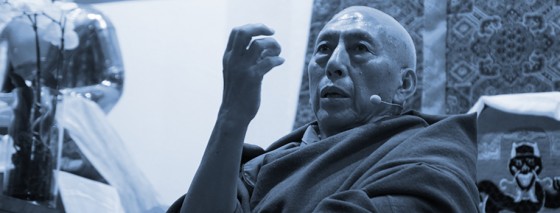Career: First Prime Minister of Tibetan Government in Exile. Eminent Buddhist Philosopher, Scientist and Politician. Counselor at World Peace University (USA) and at Institution for Asian Democracy (NYC) and many others. Close confident of HH the Dalai Lama.
Interests: Non-Violence, Education, Present Generations, Social Change, Morality and Mental Development
Hometown: Born in Kham (today China), fled 1959, living in Dharamshala (India)
Professor Samdhong Rinpoche was born as Samdhong Lobsang Tenzin in 1939, in the Tibetan province of Kham. At age of five, he was recognized and enthroned as the reincarnation of the fourth Samdhong Rinpoche. He began his monastic studies at age 12 at the University of Drepung in Tibet and eventually obtained a Doctorate in Buddhist sciences at Gyutö Monastery, Dalhousie, India in 1970. In 1959, Rinpoche fled to India to escape the repressive Chinese government in Tibet. There, he was commissioned by His Holiness the Dalai Lama to serve as a teacher to monks in exile. He was appointed director of the Central Institute of Higher Tibetan Studies in Varanasi in 1988 and remained there until 2001. On July 29, 2001, Rinpoche was named Kalön Tripa, or Prime Minister of the Tibetan Exile Government, the first political leader to be directly elected by the people in exile. He is an eminent and distinguished scholar, teacher and philosopher, and a life-long campaigner for Gandhian principles especially that of non-violence or peaceful resistance.
99Faces interviewed him in Berlin, Germany, after giving a lecture on ‘Tendrel – Mind and Reality” for students of the Tarab Institute International.
Tibet & Tibetan Parliament in Exile: The territory of Tibet is under the administration of and occupation by the People’s Republic of China, a situation that the Central Tibetan Administration (CTA) considers an illegitimate military occupation. The position of the CTA is that Tibet is a distinct nation with a long history of independence. The position of the People’s Republic of China, however, is that the central government of China has continuously exercised sovereignty over Tibet for over 700 years, that Tibet has never been an independent state, and that Tibet’s de facto independence between 1912 and 1951 was “nothing but a fiction of the imperialists who committed aggression against China in modern history”. The current policy of the Dalai Lama is that he does not seek full independence for Tibet, but would accept Tibet as a genuine autonomous region within the People’s Republic of China.
More:
Book Review – UNCOMPROMISING TRUTH FOR A COMPROMISED WORLD: TIBETAN BUDDHISM AND TODAY’S WORLD
Parliament of the Central Tibetan Administration
Video:
Concluding Session of 2010 ICTB with Keynote Address by Prof. Samdhong Rinpoche
Why meditate – Prof. Samdhong Rinpoche
Unity in Duality – An introduction, Part 1
Tweet




